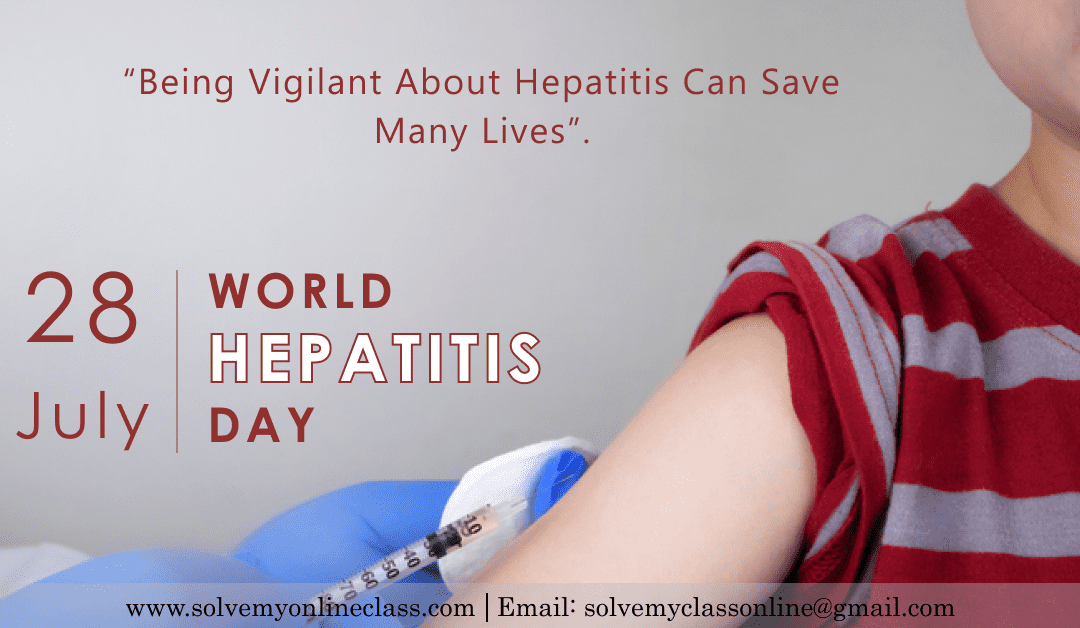World Hepatitis Day is observed every year on 28th July to increase awareness of viral Hepatitis and swelling of the liver, which causes many health issues, including liver cancer. In addition, World Hepatitis Day takes place each year on the 28th of July, bringing the world together under a single theme of increasing awareness of the worldwide burden of viral Hepatitis and encouraging real change. There have been five key strains of the hepatitis virus- A, B, C, D, and E and together, hepatitis B and C has been the most common reason of death, with 1.3 million lives lost yearly. Moreover, amidst the Covid-19 pandemic, viral Hepatitis continues to claim thousands of lives daily.
The background of World Hepatitis Day
- Dr. Baruch Blumberg invented the hepatitis B virus in 1967 and two years later developed the first hepatitis B vaccine for such accomplishments and won the Nobel Prize.
- Viral Hepatitis has been a huge worldwide health threat, with approximately two hundred ninety-six million people living with chronic hepatitis B and fifty-eight million people living with chronic hepatitis C internationally in 2019.
- This World Hepatitis Day has been one of the eight official disease-particular world health days designated by the World Health Organization.
- The date of 28th July had been selected since it was the birthday of Nobel-prize-winning scientist Dr. Baruch Blumberg, who invented the hepatitis B virus and developed a diagnostic test and a vaccine for it.
The theme of World Hepatitis Day
- The theme or subject matter of World Hepatitis Day 2022 has been ‘I Can’t-Wait.
- World Hepatitis Day is a day in respect to the hepatitis society of the world for uniting the people and making their voices heard.
- On 28th July 2022, people worldwide should take action and increase awareness of Hepatitis as Hepatitis could not wait.
- With a human being dying every thirty seconds from hepatitis-related sickness, even in the present Covid-19 cases, human beings cannot wait to act upon viral Hepatitis.
Importance of World Hepatitis Day
- The yearly observance, World Hepatitis Day, emphasizes the major impact of viral hepatitis infection worldwide, with nearly around three hundred thirty million persons living with either chronic hepatitis C or B.
- Enterprises worldwide and throughout the United States of America utilize World Hepatitis Day to raise awareness of the issue and what must be done to strengthen efforts at screening, prevention, and control of viral Hepatitis.
- Hepatitis C and Hepatitis B infections irritate along with swelling of the liver, and one must take steps to prevent the spreading of these viruses because these infections may cause chronic liver disease.
The aspirations of World Hepatitis Day
- Hepatitis A infection could be prevented by obtaining immune globulin or vaccine soon after coming into contact with the virus.
- The human beings who have been presently exposed to Hepatitis A Virus must obtain a vaccine or immune globulin on an urgent basis and not more than two weeks after the last exposure.
- Hepatitis C and B have been spread primarily via infected semen, blood, or other bodily fluids. One can get infected via close contact with a human who has Hepatitis.
- Hepatitis B is a vaccine-preventable liver infection caused by the hepatitis B virus. It could occur through sexual contact, sharing syringes, needles, and other drug injection equipment or from mother to baby during times of birth, etc.
The extent of World Hepatitis Day
- Chronic Hepatitis C could result in life-threatening and serious health-related issues, such as liver cancer and cirrhosis.
- Hepatitis D could be a short-term and acute infection or become a longer-term chronic infection, and hepatitis D could cause severe symptoms along with serious sickness that could lead to death and life-long liver damage.
- The World Health Organization (WHO) has been calling on every nation to work together to abolish viral Hepatitis as a public health threat by 2030.
- Some of the preventive measures for Hepatitis are getting the vaccines for both hepatitis B and hepatitis A, not sharing needles for taking drugs, not using the personal items of an infected human being, using a condom during sex, and practicing good personal hygiene like careful hand-washing with water along with soap.






